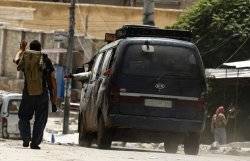Fierce fighting has continued in opposition-held districts of Aleppo for the second straight day as opposition forces continue to hold out in Syria's largest city.
At least 200,000 residents of the country's commercial capital have fled in the past two days and many more are still trapped, according to the United Nations.
The opposition Syrian National Council (SNC) on Sunday accused the government of preparing to carry out "massacres" in the northern city and pleaded for heavy weapons to enable the opposition forces to meet the regime onslaught.
The SNC also urged the UN to hold an emergency session to discuss ways to protect civilians caught up in the conflict.
Several neighborhoods in Aleppo where opposition forces are active have come under heavy government shelling, leading to high casualties among both fighters and civilians.
"Intense clashes took place in the districts of Bab al-Hadid, Zahraa, Arkub and Al-Hindrat Camp as explosions were heard and aircraft were sighted overhead," the Syrian Observatory for Human Rights said on Sunday.
Helicopter gunships flew over the Saif al-Dawla district as well as Salaheddin, where opposition forces held off an offensive by ground troops backed by tanks and helicopters on Saturday, the Britain-based rights group said.
Opposition forces claimed to destroy several government armored vehicles, and American journalist Scott Peterson, a correspondent for the Christian Science Monitor, told Al Jazeera that fighters had been resupplied with rocket-propelled grenades and anti-aircraft guns.
"It was a very up and down fight at the very early stages," Peterson said. "I think [the victory] took the opposition forces by surprise a little bit. They claimed they knocked out eight tanks."
"It was surprising to feel the degree of optimism that some of the opposition fighters there felt," he said. "Of course what they were concerned about was that the quality and the volume of the shelling ... was going to yield kind of a destroyed neighborhood."
Other civilians in the city of some 2.5 million crowded into basements seeking refuge from the intense bombardment by artillery and helicopters, an AFP correspondent said.
The London-based Observatory said more than 20,000 people, mostly civilians, have now died since the uprising against Assad's government erupted in March 2011.
'Causing exodus'
Colonel Abdel Jabbar al-Oqaidi of the Free Syrian Army said his forces on Saturday had repulsed troops in Salaheddin district and that the regime offensive had been temporarily stopped.
"We managed to force the army to the neighborhood of Hamdaniyeh," he told AFP news agency on the phone, adding that while the army had been halted on the ground, artillery and gunships continued to pound the cityAbdel Rahman said the fact the soldiers had been stopped in Salaheddin "does not necessarily mean a withdrawal as their strategy is to bombard ... to cause an exodus then launch an assault even more fierce".
An AFP correspondent said opposition forces were poised to launch a final raid on a strategic police post in the city center, where 100 men armed with Kalashnikovs have been holding out for three days.
Its capture would open a corridor between Salaheddin and the opposition-held district of Sakhur, some 6km to the northeast.
'We want weapons'
Meanwhile, Syrian National Council chief Abdel Basset Sayda called for the opposition fighters to be armed and said the opposition would discuss a proposed transitional government with opposition forces.
He insisted that Assad should be tried for "massacres" and not be offered asylum in any future solution.
"We want weapons that would stop tanks and jet fighters. That is what we want," he said following talks in Abu Dhabi.
He urged Arab "brothers and friends to support the Free [Syrian] Army" saying the support should be "qualitative because the fighters are fighting with old weapons".
He said the revolution needed support in order to achieve a "significant change" in the uprising that began in March last year.
Sayda said the opposition needed a minimum of $145m monthly to provide basic needs but had received only $15m over several months.
He added that any future plan should not include an amnesty for Assad, saying he should be put on trial.
"The Yemeni example can't be applied in Syria," he said, referring to the amnesty given to former Yemeni president Ali Abdullah Saleh following mass protests.
"There are massacres being committed. We believe Bashar al-Assad should be tried. He is a criminal and should not be given a shelter," he added.
PHOTO CAPTION
A Free Syrian Army member waves to people as they flee Aleppo July 29, 2012.
Aljazeera


 Home
Home Discover Islam
Discover Islam Quran Recitations
Quran Recitations Lectures
Lectures
 Fatwa
Fatwa Articles
Articles Fiqh
Fiqh E-Books
E-Books Boys & Girls
Boys & Girls  Hajj Rulings
Hajj Rulings Hajj Fatwas
Hajj Fatwas














